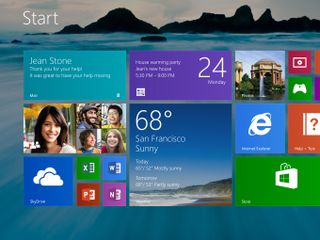Windows apps tailored for your business
In addition to the thousands of apps ready to download from the Windows Store, businesses can create apps that serve their individual needs

The Windows Store is teeming with business apps, but you don't have to spend hours searching for one that meets your company's exact requirements. With Windows 8.1, your company can create its own line-of-business app that can be rolled out to employees' tablets, laptops or hybrid devices, giving them access to the tools and data they need at the touch of a Start screen tile.
Many companies have taken advantage of Microsoft's powerful development tools to create apps that make their employees' working lives easier whether that's providing remote workers with real-time business intelligence while they're out of the office, or something as simple as a touchscreen form for submitting expenses claims.
Live tiles on the Windows 8.1 Start screen allow employees to see real-time updates from their line-of-business apps without even having to open the app itself, while end-to-end security solutions such as Direct Access allow employees to access sensitive company data within those apps, without having to stop and enter separate login details.Windows Server 2012, meanwhile, provides all the tools necessary to ensure that business apps are quickly deployed to those that need them, automatically updated, and locked down if the device is lost or stolen.
Flexible deployment
Companies can choose to deploy their bespoke line-of-business applications in one of two ways: through the Windows Store or via direct distribution by the IT department.
Apps submitted to the Windows Store can be installed by anyone, on any Windows 8.1 or Windows 8.1 RT device, making it an effective way of deploying apps to a geographically diverse set of employees, or a wider set of clients. Businesses can retain full control over which apps are installed on company devices, of course, ensuring that their own apps are prominent on the Start screen of every in-house device, for example. Apps can also be submitted in "demo mode", only unlocking access to features or sensitive data when the employee enters their credentials.
Apps can be deployed as part of a base image when new devices are handed to employees
Alternatively, companies can sideload their line-of-business apps on to employees' devices themselves. This not only safeguards the company's intellectual property, but gives the company full control over who is given access to the app and who isn't. Apps can be deployed as part of a base image when new devices are handed to employees, or installed and updated on currently deployed devices using PowerShell commandlets or management tools. With PowerShell, a simple line of code is all that's needed to deploy an application to an employee's device.
Flying service
Emirates Airlines has enhanced its in-flight service by deploying Windows 8 tablets pre-loaded with the company's bespoke KIS app to its cabin crew. The app includes a profile of all the cabin crew aboard the flight, allowing pursers to see which of the airline's 15,500 staff they will be working with that day. The profiles include a photo to help them put a name to a face, and details of which languages the cabin crew members speak, so it's easier to assign the right staff member to assist passengers. "A purser, coming together with their 16 to 24 crew members, may never have met them before," says Keith Griffiths, senior vice president of cabin crew at Emirates. "Simply being able to recognise who they're flying with can only bring about better teamwork and service to our customers."
The company's app isn't only for internal use. Crew can pass through the cabin with their Windows tablets and offer passengers in-flight upgrades, showing them the seats that are available on interactive plane maps and live prices. The tablets can also be passed to passengers to fill out customer service surveys, giving them the opportunity to provide feedback while the service is still fresh in their minds. Emirates' KIS app is a prime example of how a bespoke app developed by the company itself can add value in a way that a generic, third-party app cannot.

Once at the customer's home, engineers can flip the laptop into tablet mode, fire up BT's bespoke app, and ask customers to use the supplied stylus to sign for completed jobs and fill out a customer satisfaction survey. And when the engineer arrives home at the end of the working day, he can use the laptop to download an electronic pay slip, or reply to emails.
"One of the things that we've seen is with engineers doing multiple jobs per day, with these new devices they're actually getting more jobs done, so the benefit is really driven through, right to the bottom line," says Peter Scott, director of end user technology and security at BT.
Spanning industries
Companies across the entire business spectrum are creating their own Windows apps, spanning industries as diverse as healthcare and motor racing. At Toyota Racing Development (TRD), race engineers hand drivers their own Surface tablet while they're still strapped into their seats, allowing them to see the latest telemetry and provide instant feedback during testing sessions, so no time is wasted getting in and out of the car.
At New York Presbyterian Hospital, the combination of Windows 8.1 tablets and bespoke apps allow patients to access their medical records, update doctors on the amount of pain they're currently experiencing, or message the nurses' station to request more water, for example. The tablets also allow patients to browse the internet and communicate with friends and family, making them feel less isolated from the outside world.
The Windows difference
Windows offers businesses of all different types and sizes a choice: take instant advantage of the tens of thousands of apps already on offer in the Windows Store, or the option to develop bespoke apps that offer staff, clients and customers just the features or information they need. Indeed, there's nothing to stop businesses doing both, combining the best off-the-shelf apps with their own software.
With an enormous range of Windows devices to run those apps on, and the back-end management and security that allows companies to deploy apps with confidence, no other platform offers such a degree of flexibility to businesses.
Get the ITPro. daily newsletter
Receive our latest news, industry updates, featured resources and more. Sign up today to receive our FREE report on AI cyber crime & security - newly updated for 2024.
Barry Collins is an experienced IT journalist who specialises in Windows, Mac, broadband and more. He's a former editor of PC Pro magazine, and has contributed to many national newspapers, magazines and websites in a career that has spanned over 20 years. You may have seen Barry as a tech pundit on television and radio, including BBC Newsnight, the Chris Evans Show and ITN News at Ten.





